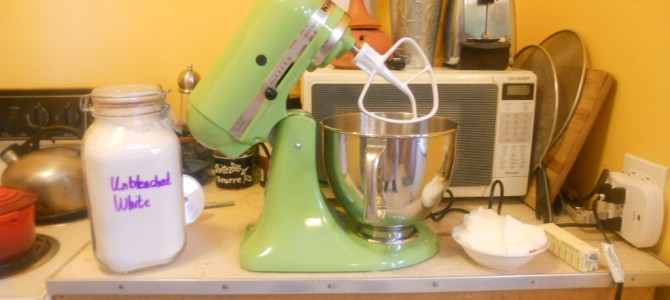
One night a few weeks back, I found myself gleefully removing the packaging of a KitchenAid stand mixer and clearing a place for it on top of the old dresser that functions as extra counter space in my Lilliputian apartment. I stepped back to admire it—bold, shining, beautiful—blood rushing through my veins like I was doing something illicit. And then I made a pound cake.
“Don’t you have to have a marriage card to get one of those things?” a friend asked (between bites of KitchenAid-made pound cake) a few days later.
That’s what I had been thinking, too. I have longed for a KitchenAid mixer for years, but always pictured myself carefully unwrapping the appliance of appliances from crisp white paper and a lacy bow at a nebulous bridal shower. The KitchenAid would be a harbinger of my new life, the cornerstone of my new home.
But at 25, I am unmarried; and at 25, I love to cook. So, I recently decided to stop living like a college girl and start purchasing some proper kitchen tools—a full set of steel pots (with lids!), a citrus grater, and a vegetable peeler. I decided that this year, I would embrace adulthood, starting in my little kitchen.
Not that I have been acting like a complete child up until this point. I do, however, find myself unwittingly part of the generation of young Americans “prolonging adolescence”: no marriage, no mortgage, no kids.
Is Putting Off Adulthood Smart or Stupid?
“Is It Smart to Delay Adulthood?” is the title of a recent New York Times Room for Debate series. “Are [millennials] being smart by delaying the rituals of adult life until they’re more stable,” the Times asks contributors, “or are they being irresponsible?”
The debaters’ answers varied. Some argued that, because of the Great Recession, adulthood is still out of reach for young Americans. “The arrested development of Generation Rent,” writes economist Ian Shepherdson, “is an economic imposition, not a choice.”
Others argued that millennials are simply (and selfishly) opting out. “Adulthood is increasing seen as a lifestyle option,” writes W. Keith Campbell, a professor of psychology at the University of Georgia. He continues: “It’s one thing to take a few years to find a career or put off marriage until one is mature; it’s quite another to just decide not to grow up at all.”
The causes of delayed adulthood are up for debate, but the symptoms are not: young Americans are working less, taking longer to achieve financial stability, and putting off marriage and childbearing. Millennials are growing older without growing up. And for better or for worse, I’m one of them.
We Can Act Like Adults Without Money, Marriage, and Kids
But what’s to be said about twenty-somethings like me—those of us who are not intentionally opting out of adulthood but are late adopters of its customs? Are we to think of ourselves of adults—can we think of ourselves as adults—if we do not have the boxes of financial stability, marriage, and family checked?
I think we can and we should.
Out of curiosity, I posed the following two questions to my Facebook friends recently:
1) What does it mean to be an adult?
2) When did you first feel like an adult (or do you)?
The general consensus of participants was that adulthood has something to do with responsibility, but that you can be married, have children, pay your own bills, etc., and still feel like a kid. Basically, even those who would be defined as adults don’t know exactly what adulthood is. I liked this response best:
If I had to pick a quality that best embodies ‘adulthood,’ I think it would be the ability to care more about other people and less about yourself.
There’s no doubt that the “rituals of adulthood” help develop this kind of selflessness. But can’t it be developed in other ways, too?
Try Inculcating Adulthood Instead of Rejecting Young Adults
What if instead of marginalizing the people who are “redefining adulthood” (I’m looking at you, think pieces and annoying listicles about millennials), we started helping them shape a new definition? And what if that definition was based less on a list of milestones that can make people like me feel like they don’t measure up and more as a state of being—maturity rather than immaturity, self-sacrifice rather than self-indulgence, responsibility rather than poor judgment, diligence rather than laziness, generosity rather than greediness, and, in the words of my friend, “the ability to care about other people and less about yourself?”
As I type, I can see my new KitchenAid glimmering in my peripheral vision. It does not symbolize the new chapter of life I once thought it would. Instead, it’s a reminder that I am opting into adulthood today, in this season—unmarried, childless, and not exactly what I would call financially stable.
Perhaps one day I’ll use that KitchenAid to mix batter for my kids’ birthday cakes. But today? I’m using it to make muffins for friends with a newborn and chocolate mousse for a dinner party. It’s a tool I’ll be using to care more about other people and less about myself. Yes, I’m an adult. I’m opting into adulthood, one cup of flour at a time.








